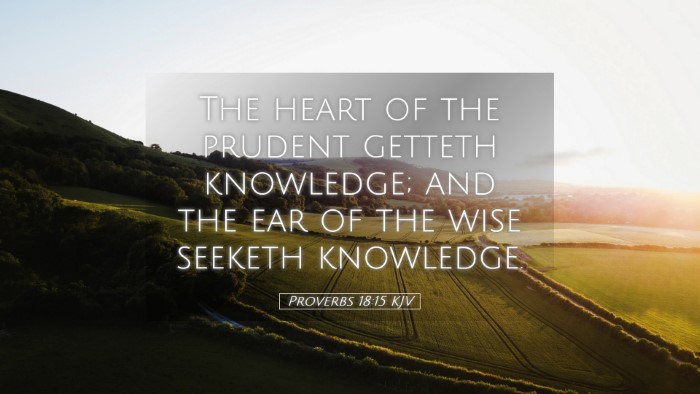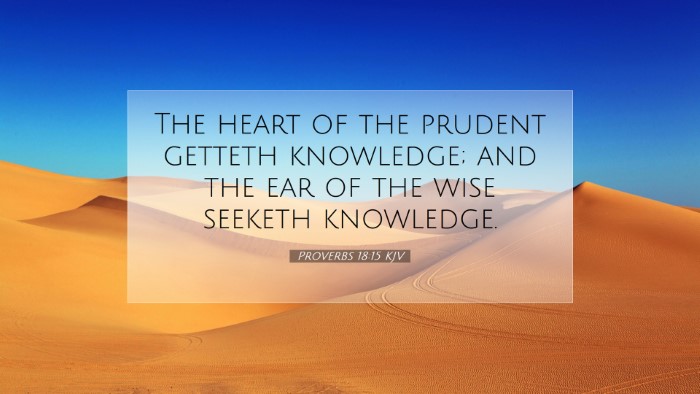Commentary on Proverbs 18:15
Proverbs 18:15 (KJV): "The heart of the prudent getteth knowledge; and the ear of the wise seeketh knowledge."
Introduction
This verse succinctly encapsulates a key biblical principle regarding the pursuit of knowledge and understanding. The distinctions between the prudent and the wise, as captured in this proverb, invite deeper exploration for those who seek to grow in wisdom and to impart it effectively.
Insights from Matthew Henry
Matthew Henry emphasizes that the heart signifies the seat of thought and emotion, where true understanding is cultivated. The 'prudent', or wise man, is portrayed as actively engaging in the acquisition of knowledge. Henry notes:
- The prudent are characterized by discernment and thoughtfulness.
- Knowledge is not merely collected but internalized, transforming one's character.
- The heart must be engaged; mere intellect without affection leads to cold knowledge.
Henry concludes that a sincere desire for wisdom will naturally lead one to seek out knowledge, highlighting a connection between the heart's condition and the pursuit of understanding.
Insights from Albert Barnes
Albert Barnes elaborates on the idea that wisdom and knowledge are actively sought after by the wise. Barnes remarks that:
- Knowledge is a worthy pursuit; it enriches one's life and informs sound decision-making.
- The 'ear of the wise' implies an active listening and openness to learning.
- Seeking knowledge is a lifelong endeavor, reflecting humility and the acknowledgment of one’s own limitations.
In his view, the emphasis on seeking indicates that wisdom is not static; it is dynamic and requires continuous effort. Those who are truly wise understand the value of instruction and the necessity of being receptive to new insights.
Insights from Adam Clarke
Adam Clarke's commentary provides a rich layer of interpretation regarding the nature of knowledge. Clarke writes that:
- The pursuit of knowledge is portrayed as a desire rooted in the heart's disposition.
- True wisdom evaluates and prioritizes knowledge that fosters moral and spiritual growth.
- There is a distinct action in seeking; it requires effort and intention.
Clarke highlights the contrast between mechanical learning and the heart-driven quest for profound understanding. He pushes the reader to evaluate the motivations behind their pursuit of knowledge, urging a reflective approach that seeks wisdom beyond mere intellectual attainment.
Theological Implications
The verse implies that wisdom and understanding are birthed from an internal disposition that values knowledge. For the pastor and theologian, this verse serves as a reminder that:
- True wisdom is a gift from God, cultivated through a relationship with Him.
- Discipleship extends beyond knowledge; it involves embodying wisdom in daily life.
- A prudent heart leads to godly choices and impactful ministry.
The call to seek knowledge reinforces a community aspect in ministry and teaching, where believers engage with each other and scripture, fostering a culture of learning.
Conclusion
In synthesizing the perspectives of Henry, Barnes, and Clarke, it becomes evident that Proverbs 18:15 is not just an exhortation to acquire knowledge but to approach it with a heart that seeks genuine understanding. The quiet seriousness of the 'prudent' heart reflects a deeper yearning for wisdom that transcends surface-level engagement.
Ultimately, this verse challenges individuals—be it pastors, scholars, or laypersons—to cultivate a life where seeking knowledge is a reflection of one's commitment to living out the wisdom that God imparts. The heart and ear must work in concert; for knowledge gained is knowledge lived, influencing both our walk with God and our impact on others.


